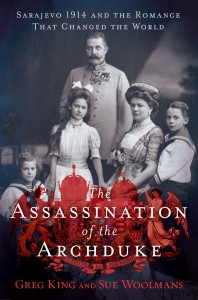The Assassination of the Archduke
 This book by Greg King and Susan Woolmans is subtitled: ‘Sarajevo 1914 and the Murder that Changed the World.’ It was recommended by Elaine at http://randomjottings.typepad.com. I decided that it was something I didn’t know enough about. It did after all set in train a sequence of events that led to the deaths of millions, including my great uncle.
This book by Greg King and Susan Woolmans is subtitled: ‘Sarajevo 1914 and the Murder that Changed the World.’ It was recommended by Elaine at http://randomjottings.typepad.com. I decided that it was something I didn’t know enough about. It did after all set in train a sequence of events that led to the deaths of millions, including my great uncle.
King and Woolmans tell the story with great verve. It is tremendously readable and only occasionally was I pulled up short by a statement such as ‘Princip fingered the revolver in his pocket.’ How could one possibly know? That is the pedantic historian in me.
The account of the morganatic marriage between Franz Ferdinand and Sophie is told in touching detail. Even though she was a princess, she did not come from the tiny group of aristocrats regarded as suitable for a future emperor and suffered many humiliations at court. The archduke comes across as a devoted husband and father. He was less successful in the political realm.
The sequence of events that made the assassination possible beggar belief, particularly the incompetence of Potiorek. the provincial governor. Again and again there were opportunities for things to happen differently and I longed to intervene and at least to rescue Sophie so that their three children would not be left parentless.
The Austrian-Hungarian empire must have seemed as though it would last forever, its rigid protocols and bureaucracies set in stone. And yet it all fell apart so quickly. The seeds of modernity were already sown in turn of the century Vienna: the home of Freud, and Klimt and Schiele and Mahler.
So: a throughly good read, and I understand a lot more about the causes of WWI than I did before I read it.
2 Comments
Lyn
December 16, 2014I really enjoyed this book too. The story of what happened to the children after the war is especially moving & tragic. They were always on the wrong side of history.
Christine Poulson
December 18, 2014They were – and yet how resilient they were, too, buoyed up, I imagine, by a wonderfully happy childhood before it all fell apart.
Hope you have a lovely Christmas, Lyn.